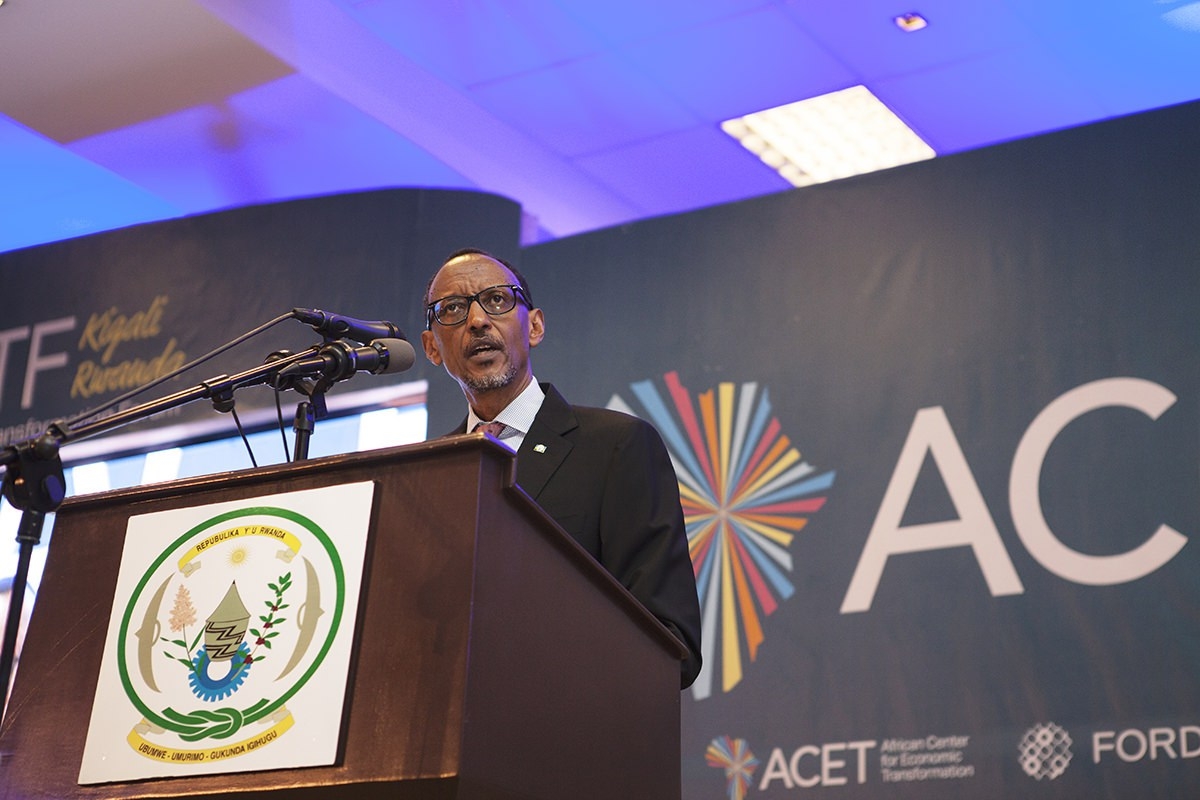
Change mindsets to change society
Let me start by welcoming you all again to Rwanda for the inaugural African Transformation Forum. I thank you for being here and contributing to this very noble cause.
I would also like to thank Dr Amoako for taking the initiative to convene this Forum here in Kigali, with commendable support from the Ford and MasterCard Foundations.
The focus of this event mirrors what we are working to achieve in Rwanda, our wider region, and all across Africa, and we are happy to be associated with it going forward.
I know that the deliberations over the past two days have been fruitful. As you conclude later on, allow me therefore to offer a few thoughts about where we are going and how we will get there.
Everything starts with a clear and even very simple vision for the future that everyone understands and agrees on.
We all want a prosperous, stable, and equitable Africa. And we want it as soon as possible. Period.
This contrasts so radically with the African past and present that we rightly speak of the need for transformation in the real sense.
That is easy to say, but making it happen is understandably going to be harder. However, it can become reality within our lifetimes, as the detailed work presented in this Forum illustrates.
This is step two: a focused set of concrete and measurable outcomes to target, gaps to bridge, and barriers to remove, like electricity, skills, access to finance, agricultural productivity, technology, manufacturing, trade, and so on.
So if we know where we want to go and what has to be done to get there, then why do we seem stuck on implementation?
First of all, a wish list is not a strategy for getting things done. It is a recipe for an infinite loop of conferences and declarations. I am glad Dr Amoako mentioned something to that effect earlier.
The institutions and individuals represented in this room are full of wisdom, talent, and knowledge, yet cannot do everything or even a small part of what needs to be done. We simply do not have the money, time, or information.
You and I do not implement the transformation agenda. Everyone does, collectively, even without necessarily being coordinated.
Beyond a certain level of complexity, we really only have two strategic tools in my opinion.
One, let’s change how people think. Two, shape how resources are allocated and later on utilised.
Let me share a few points, drawing on the experience of my own country.
Rwandans are ordinary people with an extraordinary history.
Twenty-two years ago, Rwanda’s very survival was at stake and everything was a priority.
We figured it out by doing it, because we had no choice. Help took years to arrive or was not appropriate to our circumstances. We had to start with our own resources and ideas, and in fact our desire to get out of the mess and chaos our country was in.
This taught us some important things.
You don’t need to have all the answers or all the funds to get started. Constantly assess and correct course, but don’t wait for perfection or rescue.
As we began to turn our attention to economic transformation, these habits and lessons served Rwanda well. They have become part of who we are and how we approach challenges.
First, transformational change happens at the level of mindsets. This was certainly true for rebuilding our national unity. But it is valid for creating prosperity as well.
This challenge is not technical; it is political and social because it is about people. A mindset of urgency, ownership, responsibility, and service as well as quite frankly the mindset of money-making and long-term investing.
Citizens bear most of the risk of transformation. They have to be included in the decisions and understand the benefits because success comes from what they do every day. So we need mechanisms that include everybody and encourage things to move forward.
Second, no institution or individual has all the resources or answers. The right strategy is to use our limited means to send clear signals to the market and to partners about how best to allocate and utilise these resources.
Funds will come to join and scale up good initiatives that are underway. There is a lot of cash in this world looking for a useful function, both in terms of profit and social impact.
We often fall short on things that governments are generally not very good at anywhere: managing big infrastructure projects, picking winners in the economy, and so forth.
In the African context, however, we can grow very old waiting for the invisible hand of the market to work its magic. Government often must lead, catalyse, support, and invest by bringing together partners to fix market failures and mitigate risk.
Examples in Rwanda include our growing conference and events infrastructure, as well as our provision of broadband internet and our laptop production partnership with Positivo BGH.
But ideally this should be done using conducive economic incentives and logic rather than trying to produce and implement directly.
Furthermore, and I hope this came out in your discussions here, or will, we actually already have much of what we need right here in Africa. We will never win by discounting the quality of our own products and our people.
Finally, we have to stay adaptable and flexible. Plans and frameworks should not become a barrier to action or to course correction.
Mistakes will be made along the way and money wasted. But that should not be the end of the road. It serves a purpose if it helps to discover the most effective approach more quickly, and builds public understanding and unity of purpose.
Neither business nor government can afford to try one idea, wait a few years to see how it works, then scrap it and start the cycle again.
By working together, with an understanding of the strategic environment, we can speed up progress.
The Coalition for Transformation in Africa, and thank you Dr Amoako for this, promises to be an innovative outcome of this gathering. One way to avoid it becoming a venue for more talking among like-minded elites is to build in an element of outward-facing service to the work of each Chapter.
Our minister earlier on gave background and mentioned that aid is declining. First, I think it was bound to decline at some point. If anyone thought it would be there forever, we see it will not.
Second, we should have drawn lessons long ago from our history and experiences. It is not even the decline that we should be worried about now. We needed to be more worried about how it was being invested.
Aid has been very helpful because it addressed many problems, and helped many needy people, who by the way are also a product of bad aid investment, with the numbers of people who need aid increasing. There has been a cycle where we have invested in perpetuating the problem.
So the decline of aid is a paradox: a very bad thing but also a very good thing. Let me rest my case there.
I am looking forward to the best ideas that can come from this room given the knowledge, talent, and experience that mark the backgrounds of the people here.
I thank you very much for your kind attention.
AUthor: Paul Kagama, President of Rwanda








